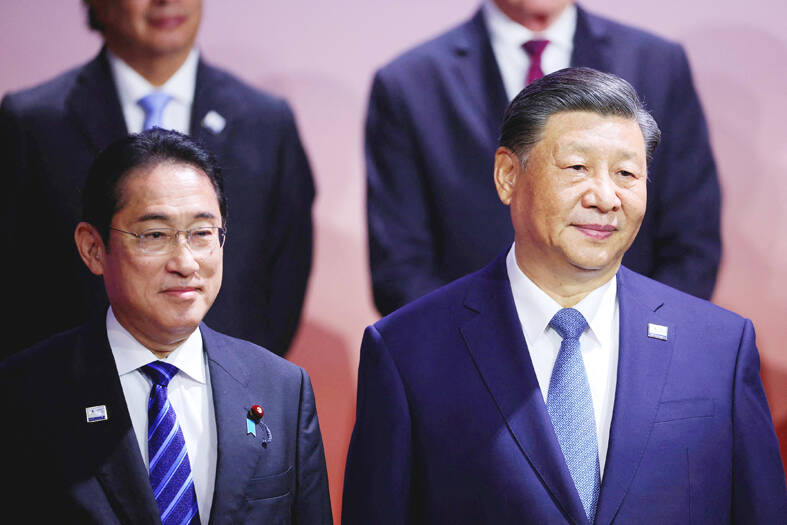Japanese Prime Minister Fumio Kishida and Chinese President Xi Jinping (習近平) agreed to seek a resolution through dialogue to a dispute over wastewater from the Fukushima Dai-ichi nuclear power plant, Kishida said after their first summit in a year.
“I urged that this be dealt with calmly on a scientific basis,” Kishida told reporters in San Francisco.
“We will hold discussions based on science at an expert level,” he added.

Photo:Reuters
Kishida described the summit as “very meaningful.”
Xi told Kishida Japan’s discharge is a matter of international public interest and the country needs to handle the issue in a responsible and constructive manner, China Central Television (CCTV) reported.
The meeting on Thursday came a day after US President Joe Biden hailed an improvement in US relations with China following his own talks with Xi. That warmer tone helped open the way for US ally Japan to pursue its efforts to shore up ties with its biggest trade partner.
The two neighbors have been wrangling over everything from semiconductors to nuclear waste and the fate of Japanese citizens detained in China. A territorial dispute over uninhabited islands near Taiwan continues to simmer.
Kishida said he urged Xi to end a ban on imports of Japanese seafood, imposed by China in response to Japan’s ocean discharge of wastewater from the wrecked Fukushima nuclear plant.
The International Atomic Energy Agency has said the release is safe.
The wastewater issue has hurt sales in China for Japanese companies including cosmetics company Shiseido Co, which slashed its profit forecast last week. The Chinese reaction has been a factor in turning the Japanese public to their most negative on China since 2014, according to a poll that was published last month.
Xi told Kishida at the start of the meeting that the two countries should focus on common interests, properly handle differences and re-confirm their reciprocal strategic relationship, the CCTV reported.
Supply chains between Japan and China are deeply intertwined, he said, adding it was in no one’s interest to decouple and break those chains, Chinese state news agency Xinhua reported.
“I want to work with you to create a brighter future for Japan-China ties for the sake of the next generation,” Kishida responded.
The leaders also agreed to restart high-level economic talks at an appropriate time, the Japanese Foreign Ministry said in a statement.
Tokyo last year dubbed its neighbor an “unprecedented security challenge” and is planning its biggest military buildup since World War II, a stance that has riled Beijing.
During the meeting Kishida also called for the release of Japanese citizens being held in China, calling for the individuals to be returned. The detentions have cast a pall over the business environment in China, although Beijing has defended its moves as part of the protection of its national security.

The CIA has a message for Chinese government officials worried about their place in Chinese President Xi Jinping’s (習近平) government: Come work with us. The agency released two Mandarin-language videos on social media on Thursday inviting disgruntled officials to contact the CIA. The recruitment videos posted on YouTube and X racked up more than 5 million views combined in their first day. The outreach comes as CIA Director John Ratcliffe has vowed to boost the agency’s use of intelligence from human sources and its focus on China, which has recently targeted US officials with its own espionage operations. The videos are “aimed at

STEADFAST FRIEND: The bills encourage increased Taiwan-US engagement and address China’s distortion of UN Resolution 2758 to isolate Taiwan internationally The Presidential Office yesterday thanked the US House of Representatives for unanimously passing two Taiwan-related bills highlighting its solid support for Taiwan’s democracy and global participation, and for deepening bilateral relations. One of the bills, the Taiwan Assurance Implementation Act, requires the US Department of State to periodically review its guidelines for engagement with Taiwan, and report to the US Congress on the guidelines and plans to lift self-imposed limitations on US-Taiwan engagement. The other bill is the Taiwan International Solidarity Act, which clarifies that UN Resolution 2758 does not address the issue of the representation of Taiwan or its people in

US Indo-Pacific Commander Admiral Samuel Paparo on Friday expressed concern over the rate at which China is diversifying its military exercises, the Financial Times (FT) reported on Saturday. “The rates of change on the depth and breadth of their exercises is the one non-linear effect that I’ve seen in the last year that wakes me up at night or keeps me up at night,” Paparo was quoted by FT as saying while attending the annual Sedona Forum at the McCain Institute in Arizona. Paparo also expressed concern over the speed with which China was expanding its military. While the US

SHIFT: Taiwan’s better-than-expected first-quarter GDP and signs of weakness in the US have driven global capital back to emerging markets, the central bank head said The central bank yesterday blamed market speculation for the steep rise in the local currency, and urged exporters and financial institutions to stay calm and stop panic sell-offs to avoid hurting their own profitability. The nation’s top monetary policymaker said that it would step in, if necessary, to maintain order and stability in the foreign exchange market. The remarks came as the NT dollar yesterday closed up NT$0.919 to NT$30.145 against the US dollar in Taipei trading, after rising as high as NT$29.59 in intraday trading. The local currency has surged 5.85 percent against the greenback over the past two sessions, central